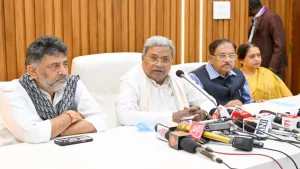Bengaluru, Karnataka – The Language Policy Row has intensified across India as Karnataka’s Congress government joins Tamil Nadu and Maharashtra in resisting the National Education Policy (NEP) 2020’s three-language formula. The state’s move toward a two-language curriculum has sparked widespread debate among educators, policymakers, and stakeholders, creating significant controversy in the education sector.
Current Language Framework in Karnataka

The Language Policy Row in Karnataka centers around the existing three-language system implemented in state board-affiliated schools. Currently, students can choose Hindi, Sanskrit, or any other Indian language as their third language from Class 6, while Kannada and English remain the first and second languages respectively.
Also Read: Shashikant Shinde Maharashtra NCP President: Revolutionary Leadership Takes Charge
In minority language schools including Urdu, Marathi, Telugu, and Tamil-medium institutions, the first language corresponds to the medium of instruction. The Language Policy Row becomes more complex in these settings, where English typically serves as the second language and either Hindi or Kannada as the third language.
Government’s Position Against Hindi Imposition
The Language Policy Row gained momentum when Karnataka Congress posted on social media platform X on June 29, stating that mandating Hindi as a third language would create discord and pose learning difficulties for Kannada, Tulu, and Kodava speakers. The party emphasized that South India’s linguistic diversity represents a vibrant tapestry of languages including Kannada, Kodava, Tulu, Konkani, Tamil, Telugu, Malayalam, and many others.


Chief Minister Siddaramaiah has firmly backed the two-language policy, telling reporters in Mysuru that his government remains committed to this approach. His stance has become central to the Language Policy Row as Karnataka follows the example set by Tamil Nadu and Maharashtra in opposing perceived Hindi imposition.
Expert Support for Two-Language Policy
The Language Policy Row has found support from education expert Niranjanaradhya VP, a key member of the government’s State Education Policy commission headed by former UGC chairman Sukhadeo Thorat. He argues that introducing a third language creates additional burden on children, hampering their cognitive skills development.
Niranjanaradhya advocates that Karnataka should follow Tamil Nadu’s example by implementing two languages in state board schools – Kannada as the regional language and English as the second language. His position in the Language Policy Row emphasizes that studies prove language proficiency develops better among adults than children, making early introduction of additional languages counterproductive.
Opposition from Multiple Stakeholders
The Language Policy Row has generated significant opposition from various quarters. Basavaraj Horatti, Chairman of Karnataka Legislative Council, wrote to Chief Minister Siddaramaiah on July 13, urging continuation of the three-language formula to foster multilingualism and national integration as envisaged in the Kothari Education Commission (1964-1966).
Horatti’s intervention in the Language Policy Row highlighted that over 17,909 students scored perfect 100 marks in Hindi during SSLC examinations – more than in any other subject. He raised concerns about the livelihood of 15,000 Hindi teachers and their families if the government abandons the three-language formula.
Private School Management Concerns
The Language Policy Row has prompted strong reactions from private school associations. D Shashikumar, General Secretary of Associated Managements of Primary and Secondary Schools in Karnataka (KAMS), warned of legal action if the state government drops the existing three-language policy in state board-affiliated schools.
KAMS appealed to avoid disturbing the existing system in their representation regarding the Language Policy Row, instead suggesting implementation of key reforms to the language assessment system. They argue that the government’s approach represents knee-jerk reactions following developments in Maharashtra.
Fundamental Rights and Linguistic Minorities
The Language Policy Row has raised constitutional concerns about fundamental rights violations. Shashikumar argues that limiting language choice violates parents’ and students’ fundamental rights as established in various Supreme Court judgments. He warns that switching to a two-language policy would hamper 4,000 Urdu-medium schools and their teachers.
The Language Policy Row particularly affects linguistic minorities speaking Tamil, Tulu, Telugu, and Marathi, who would be deprived of linguistic choices under the proposed two-language system. This aspect adds complexity to the debate as it involves constitutional protections for minority language rights.
Cognitive Development Arguments
The Language Policy Row features competing claims about cognitive development impacts. While supporters of the two-language policy argue that additional languages hinder cognitive skills, opponents contend that multilingualism enhances cognitive development according to psychological studies.
The Language Policy Row reflects deeper disagreements about optimal language learning approaches, with some advocating for early multilingual exposure while others prefer focused bilingual education.
Current Status and Future Implications
The Language Policy Row remains unresolved as the school education department has yet to consider a formal policy shift. The State Education Policy commission has not submitted its report on the two-language policy proposal, leaving the issue in limbo.
The Language Policy Row represents broader tensions between regional autonomy and national integration in education policy. As Karnataka follows Tamil Nadu and Maharashtra’s lead, the debate may influence other states’ approaches to language education, potentially reshaping India’s linguistic education landscape significantly.

